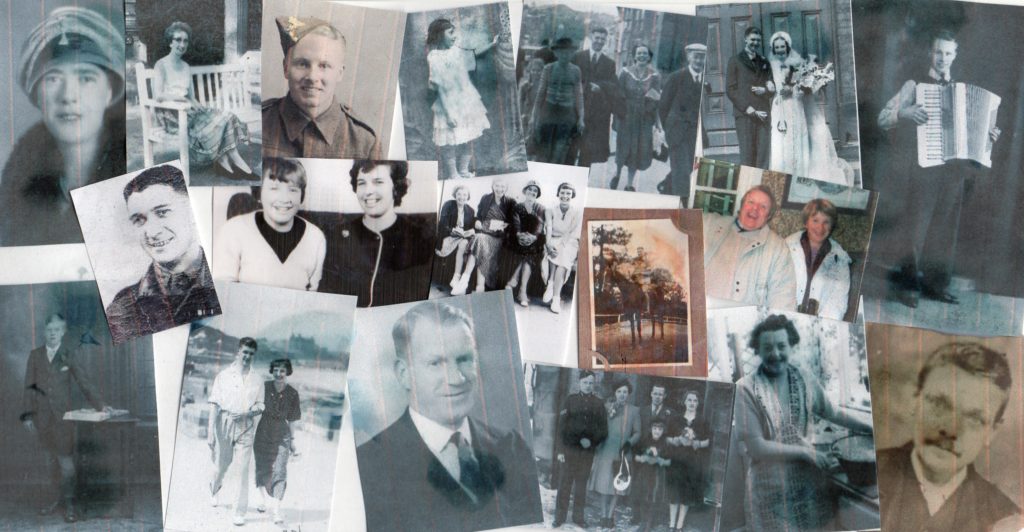My Family and Other Criminals
This is not the way that albums should be created. Most artists decide to make an album and then start writing. The themes and the title evolve together. When I started recording I already had 50 to 60 songs and more arrived whilst I was recording “Whitby Lifeboat”. I came up with the title while brainstorming titles for “Whitby Lifeboat”. The songs for “Whitby Lifeboat” were already chosen, however. There were plenty of family stories (“I think its going to rain”, “I’ll go to sea no more” and “The last time that I cry”) but there wasn’t much of a crime theme.
“My family…” became the title for album two. This gave me the chance to offload the remainder of my personal songs. When I was growing up, my grandparents would tell me the stories of the past. At the time, they seemed to endlessly repeat these stories. Now they are long gone, the ones they kept repeating are the only ones I remember.
I am mindful not to bore Adam with my stories but here, in song form, are a few of them. Some of them are pretty much as they happened (“Its Late”for example), most use artistic license (“Moving On”) and others bear only a passing nudge to reality (“Where the Old People Dance”). Sherriff Ants Trapraneur likes to talk about legacy and these songs, for good or bad, are just that. With the album title, the remainder of the songs bear a passing reference (sometimes more) to crime.
Album Cover: Back row (L to R): Jane North (great great aunt), Winifred Sharman (1911-1999, great aunt), Ronald Oldfield (1918-1973, grandfather), Vera Sharman (1914-1996, grandmother), Scarborough: Diana Tew (mother), Ellen Robinson (grat grandmother), Frank Tew (grandfather), Vera Sharman (grandmother), Frank Robinson (great grandfather), Frank Tew (1913-1984, grandfather) and Vera Sharman (on their wedding day, Sheffield), Ronald Oldfield
Middle row: Frank Tew, Patricia Oldfield (1950-2010, aunt) and Diana Tew (1941-2014, mother), Vera Sharman (on right) and friends, Frank Tew (royal signals, India), Brian Oldfield (b. 1942, father) and Patricia Oldfield
Bottom row: Richard (Dick) Whittington (1890-1970, great great uncle), Scarborough: Frank Tew and Vera Sharman, James Oldfield (1893-1969, great grandfather), Ronald Oldfield, Jessie Whittington (on their wedding day, Sheffield), Richard Whittington (1890-1970, great grandfather), Betty (Sal) Whittington (great aunt), Edna Oldfield (1923-2001, great aunt), Jessie Whittington, Tom North (1856-1935, great great grandfather)
Rough Diamond is the only song that doesn’t really meet either brief. The album needed another song and I needed to up the overall quality on the album so this fitted the bill. The music came first and the words were inspired by a scene the TV series “Shameless” which is about a family on a housing estate in Manchester. In episode one James McAvoy (Steve) spots Anne Marie Duff (Fiona) dancing in a night club. The plot of the song deviates (a lot) as usual…. Kevin Todd is on harmonica.
Consider all the faces you see in all the places
Those encounters don’t amount to a thing
And all the conversations those small ingratiations
That to your life no meaning will bring
She had a job in Waitrose where she stacked shelves of potatoes
It didn’t shackle her dreams
So come the Friday she’s off and on her own way
She’s pulling on her white jeans
So that’s my rough diamond
On a night that’s filled with tedium in a club that’s quite Bohemian
I saw my diamond sparkle that time
You couldn’t call it dancing but I found her quite entrancing
That’s to say I found her sublime
I started dancing with her my legs were all a quiver
I was giving my best
She wasn’t that receptive but I was not perceptive
She didn’t look that impressed
So that’s my rough diamond
After fourteen Margaritas and a couple of fajitas
She finally warmed to my smile
In the back seat of an uber she turned into a cougar
I must confess that I liked her style
At her house and in our ardour we sneaked past her sleeping father
And we crept up the stairs
That was the first time and now I’m with my diamond
It started off our affair
So that’s my rough diamond
The damned accordion band (Sheffield, 1930s): my grandad Ron was in Ron Miller’s accordion band and they were the “boy bands” of their day. He died when I was 8 so I remember little of him but this is based on a story recounted by my Nan Jess. She went to see his band and took a shine to him. Unfortunately, so did her friend. The next time they went nan hitched her skirt a little shorter so she could flash a bit of ankle and placed herself on the front row. The rest, as they say, is history.
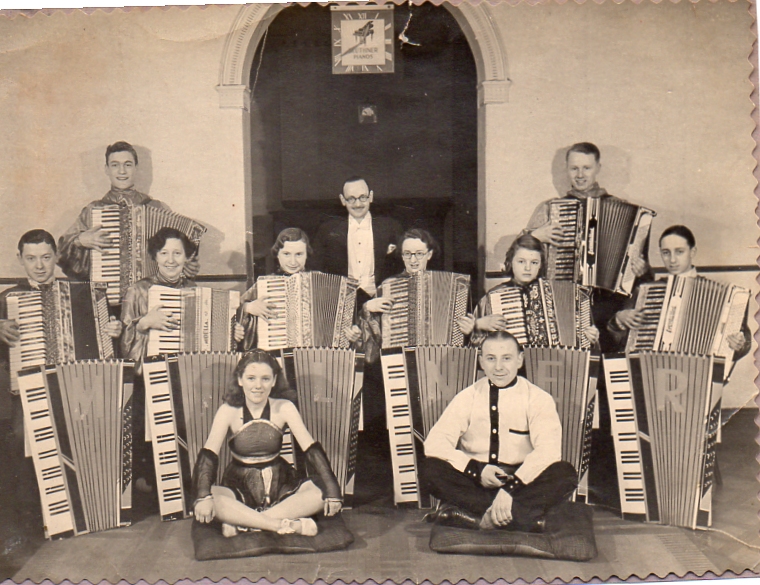
The more you swing the more you sway
The more you blow my blues away
The more you jitterbug and jive
The more you keep my heart alive
I went out one Friday night to see Ron Miller’s band
There I saw your handsome face at your music stand
That’s the day I saw the damned accordion band
The ginger hair the flashing smile
I liked your suit I liked your style
And when you played those polka tunes
There was nobody else but you
When I cast my eyes on you I thought I’d make you mine
But I saw that my best friend had the same thought at the time
The day I saw the damned accordion band
And when I went out next Friday
I made sure that you’d notice me
I made sure that my ankles showed
And pitched myself on the front row
And when you saw my pretty legs no-one stood a chance
And when the band had time to rest you asked me up to dance
The day I saw the damned accordion band
And through the laughter through the tears
You were mine for forty years
And when you left in seventy three
No other man would dance with me
In my twilight looking back at Ron Miller’s band
A don’t regret that Friday night I saw you at the stand
I’ll never rue that damned accordion band
Where were you? (Sheffield 1962)
When Peter Stringfellow died, my Sheffield facebook links informed me that he had brought the Beatles to Sheffield. On April 2nd 1963, they played the Azena Ballroom on White Lane, Gleadless. Having had a hit with Please, Please Me, Brian Epstein negotiated their fee up to £85. 2,000 tickets were sold for a venue that held 500 people so the evening was somewhat chaotic. According to the Beathles Bible website, they opened with “I saw her standing there” and closed with “Long tall Sally”.
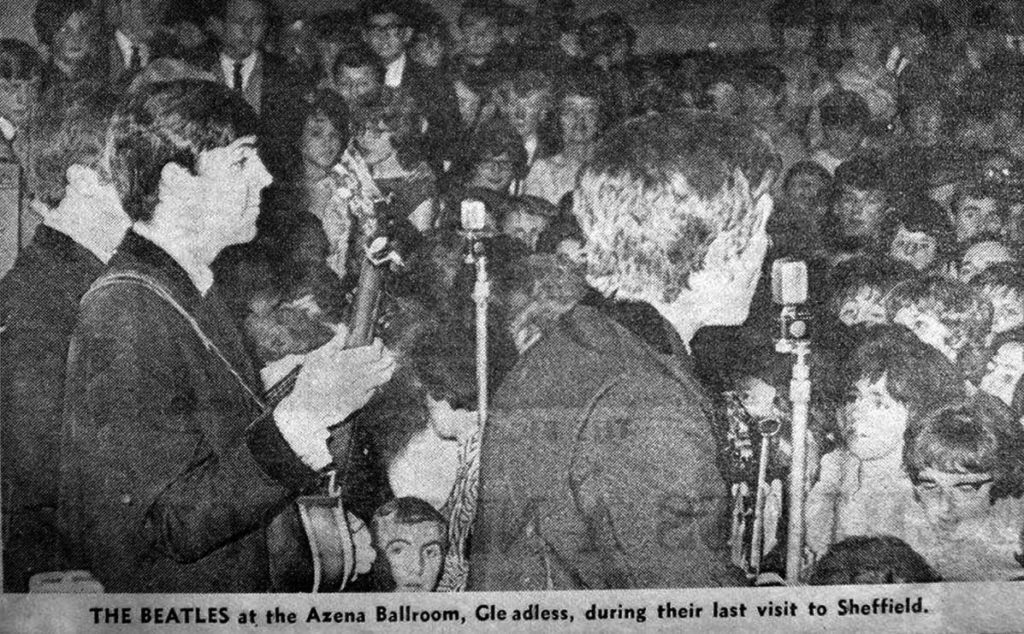
The Azena Ballroom is now a co-op. I’ve shopped there. Its not more than ten minutes walk from where my mum lived and twenty minutes from my dad’s house. They met through the local congregationalist church where they were captain and queen. If they did go, they never told us and the song asks why. Firstly, they were older; mum was 21 and dad was 20. As far as I know, Mum was working as a librarian at Manor Top and dad was attending teacher training college in Leeds. He had an Ariel scooter and would return to Sheffield at weekends. To keep himself warm in winter he would pack his clothes with newspaper. When he got home, he would have to spend time thawing out in front of the fire. In winter he added a sidecar for stability. As far as I know the remains of the Ariel are still buried in the back garden of 16 Chatsworth Park Avenue. Dad was never really into pop music, preferring Glenn Miller and the big bands of the era before. We do have some of mum’s singles, which include Elvis, Cliff Richard and Roy Orbison.
I did ask mum’s friend, Joan Griffiths, what day to day life would have been like fior them then. Life revolved round church, both spiritual and social. They did have a television and would watch Sunday night at the London Palladium.
April 1963 the Beatles came to town
The grand Azena ballroom on White Lane
The greatest band in history ten minutes from your door
A chance like this would never come again
Now I’m asking why (x2)
Now I’m asking why you didn’t go
I could have dined out on the tale the best days of my life
Anecdotes like this are rather rare
I could have bored my children and terrorised my wife
If only you’d been there
Now I’m asking why…
If I’m being honest it doesn’t sound appealing
An overcrowded room with a cacophony of screaming
But you’d see Paul McCartney shake his mop-top hair
And tell your children you were there
You were in the library up on Manor Top
Dad’s attending college up in Leeds
You would thaw him out after riding home each night
A concert is not one of your needs
Now I can see why (x2)
Now I can see why you didn’t go
We went to visit the Blades (Sheffield, 1970s)
I loved football, both playing and watching it, for as long as I can remember. Did wasn’t interested so it fell to my Graddad Frank to take me. We would travel to Sheffield on a Saturday morning and arrive for lunch. Meat and Tater (Potato) is the only meal I can remember my Nan Vera cooking. My sister tells me she made very good cakes. Grandad had a small rose garden at the front of their terraced house. Most of the year it was only mud and manure; I’ve never tried to grow roses myself becuase of this. There is a lot of coal in the area and the soil is black. At the end of the back garden, the World War Two Anderson shelter was still used for storage.

Granddad and his cousin, (Uncle) Aden Roebuck were friends and season ticket holders. I don’t know how they did it but, whenever I went with them, they always found me a seat near them in the John Street stand. When I first went, there was no stand opposite opposite but a cricket ground. Luckily I was there for a golden era; Sheffield United were riding high in division one (the top at the time) and Tony Currie played a few times for England. I was a Leeds fan (small boys can smell success) and I even saw the great Don Revie team. Fearful of violence, I was not allowed to wear my “Super Leeds” t shirt. You wouldn’t tell from Aden and granddad’s comments that United were doing well. However well they were doing, it never seemed to be as good as some mythical team in the past. Half time would be a drink from a flask of tea and the scores over the tannoy. With no internet, you relied on the ground to keep you updated with your rivals. Even if they weren’t in the same division, Sheffield Wednesday had their score read out and there was a cheer if they were loosing. The open air toilet did smell of tobacco. Although I’ve never smoked, I like the smell and I will detour to follow a smoker from time to time. The “Green ‘Un” was a paper that was rushed out at full time. By the time we got home we had a print out of the final scores and first half reports.
Granddad was a patient man who never raised his voice or had an unkind word (apart from the team). His devotion to me was great. I remember a game of football in the back garden when I beat him 100 to ninety something. That must have taken a lot of patience. Once, when Sheffield United’s game was snowed off he took me over to Hillsborough to see Sheffield Wednesday. We must have stood at the Leppings Lane end as I can remember that to Kop had no roof and was higher at one side than the other. In the 1990’s I lived in Hillsborough and remain a sufferer of Sheffield Wednesday (to be a football fan is to learn about diappointment). Please don’t tell my family; I hope they are not reading this.
Saturday at nan’s was meat ‘tater pie
With gravy and Henderson’s Relish besides
Then after dinner we’d wrap ourselves warm
With red and white scarves for our uniform
Then round the corner to our Uncle Aden
In a Morris 500 we’d join the parade and
By East Bank Road my patience was fading
As we went to visit the Blades
We went to visit the Blades
Saturday 3 o’clock at Bramhall Lane
My grandad, his cousin and me as a lad
When I think of them now it makes me feel sad
But looking back they’re the best times I had
When we went to visit the Blades
From high up in John Street we’d watch the parade
Woodward and Dearden leading the Blades
We suck on our humbugs and mint impereals
We watch Tony Currie with presence ethereal
Half time something warm with the semblance of tea
As Aden’s bemoans that missed penalty
And grandad soaks everything in silently
We went to visit the Blades
Chorus
I remember the Kop as they sang toe to toe
The open air toilet that smelt of tobacco
Then after the game do it all in reverse
Aden’s convinced that the whole team is cursed
Grandad’s still quiet that’s what I recall
He’d puff on a fag and say nothing at all
I think that he must have liked his football
As we went to visit the Blades
Chorus
We’d pick up a Green ‘Un on our way home
And check to see how our rivals had done
In time granddad’s smoking would be his failing
He passed on a spring day before Hysel Stadium
And I mustn’t feel lonely, downhearted, benighted
And nothing today brings me this much excitement
As those days when we went to see Sheffield United
When we went to visit the Blades
Chorus
Moving On (North Staffordshire Polytechnic, 1983)
I went to North Staffordshire to study business studies. Who knows what our motives are for anything. I guess I feared failure and I avoided risk. To get into North Staffordshire I needed DDE at A levels. I got BBC. The course didn’t stretch or interest me; I was going to become a Jack of all Trades. My accommodation was a terraced house on Hillchurch Street, Hanly. The area was run down; I would come home and found a street nearby had been demolished. It felt like the differs were moving ever close. I remember a house party which ended when the toilet was smashed; someone dropped a bottle of wine. The tennants spent the next day cruising the empty houses looking for an unlocked door and an avocado toilet befoe they were discovered. My housemates; Hugh and David were often away and I was left alone in a strange town. I left after a term; in doing so, I could still get a three year grant for another course.
Sue, me and mum outside Hillchurch Street, Hanley
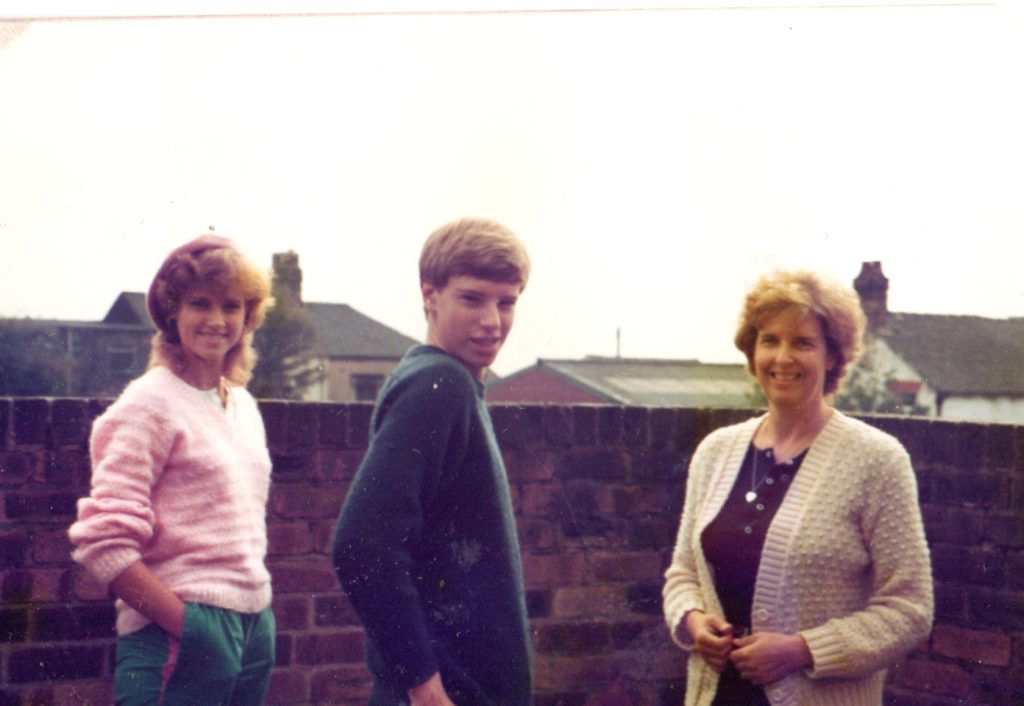
The car was red (a Hillman Avenger) and mum felt my absence more keenly than I did. She never did any baking though.
Sunlight drips off the pavement
I’m heading south for the sun
New dreams on the horizon
Today I am moving on
Woke up in a small town
Got my dreams all packed, guitar on the rack
I’m moving on and I won’t look back
My life in a red car
A dozen shirts and a hundred hurts
And a thousand nights and ten thousand slights
But a million smiles to light my life
Chorus
Downstairs mother is baking
Kneading tears and pummelling fears
A love that lingers down the years
I don’t really notice
I can smell my dreams like a fragrant crème
And the best laid plans hung out like hams
And hope that crashes through the dams
Chorus
And every place I hang my hat
I never know if I’ll come back
But no matter where I roam
There’s somewhere that is always home
Chorus
Woke up in a new town
But my family are here with me
They’re in my heart we never part
My life with a new start
A hundred routes to tempt my boots
And a different future every day
So who knows what may come my way
Chorus
Where the old people dance (The Fat Cat and The Leadmill, Sheffield, 1983-1994)
The places are real but the story certainly isn’t. After North Staffordshire, I went to Sheffield University to study Economics (successfully this time). “I chanced on a pub far away to the south, all alone like a tooth in a prize fighters mouth”. My discovery of the Fat Cat, Alma Street, Sheffield was the opposite of this. Chance did not play a part. I had developed a taste for “real ale” which, in the 1980s was starting to revive in fortune after alost being wiped out by largers and keg beer; easier to make and transport but lacking in taste. My neighbours in Lincoln, Pete and Colin, were both in the local Campaign for Real Ale (Camra). They told me that I should seek the Fat Cat. It was a free house, not tied to a single brewery, and it sold ten different beers. The most any pub in Lincoln sold at the time was three or four. In Freshers week, armed with my Camra Good Beer Guide and an AZ map of Sheffield, I went in search. It took me longer than I expected. I blame the change in goegraphy; the area looked like it had been abandoned to fate and nature. In reality, I can’t have been much use at reading maps. I eventually found it; the only brick house amongst empty plots and faceless low rise industrial units. Anyone who knows the pub also knows that it is not to the south; please check out how many things rhyme with “north”!
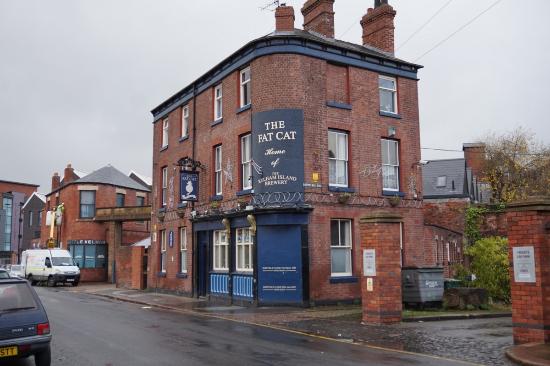
I hear that the area and the pub are now much revived. At the time, the carpets were sticky with years of ingrained beer. One summer night, when my friend Lewis tried to open the window, the bottom of the frame remained whilst the rest slid upwards. Fortunately it was too close to go too often for my health and meagre student wallet to survive but we still had many joyous random nights there. In the days when pubs could not open before 6pm on a Sunday I remember waiting outside; having walked all that way. There was nowhere else to go. Walking home always felt like it took much less time than walking there.
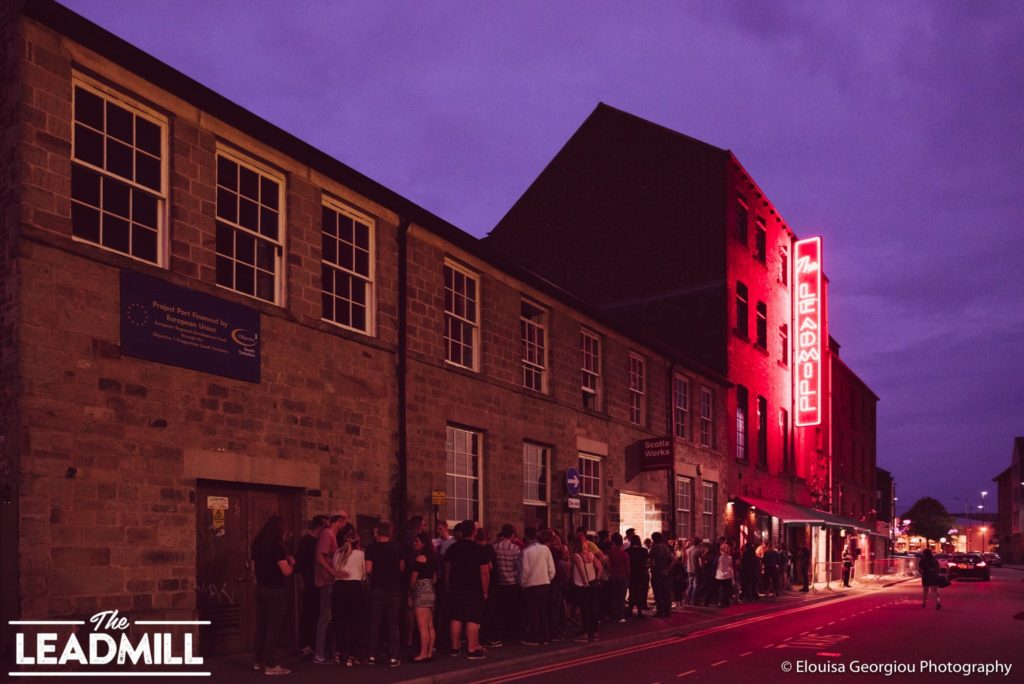
Whilst I did go the the Leadmill a few times in my student days, my rare trip to the clubs was more likely to be to Barry Noble’s Roxy Nightspot (The Roxy). I frequented it more when I worked for the department of Employment and later as a student nurse. The Leadmill was a club like no other I had seen before; you didn’t have to wear a suit and it sold real beer, although in plastic mugs and not as nice tasting as in the Fat Cat. In the high ceiling of the dance floor sweat would condense on the steel frames and later, as people left and the temperature cooled, would fall as pseudo rain. Our main night was The Beat Club on a Thursday, playing music from the sixties and seventies. I did see a few bands; Fairport Convention and Robyn Hitchcock and the Egyptians. Davy Spillane was a no show, a habit of his apparently. Sunday mornings was newspapers and jazz.
I was new to the city, quite shy and nervous
Despite reservations I was eager and curious
I set out to bid the fair city good day
I wandered, meandered, let fate lead the way
I chanced on a pub far away to the south
Alone like a lone tooth in a prize fighters mouth
It looked too inviting to not take a chance
Though its not where the old people dance
Chorus
Dance, dance, where the old people dance
Come find a partner and come take a chance
You never know where or when you’ll find romance
So dance where the old people dance
I huddled my pint to me watched from a table
The pub became louder, a hostel of babel
I felt peripatetic, pathetic and lonely
As people formed huddles I wished I could only
Rip myself out from my corner and say
Hello to somebody and how was your day
And then a bit later I’d make my advance
Do you know where the old people dance?
She stood at the pump like a tall Elvin queen
Ringlets of burgundy eyes firing green
She exuded confidence, class and disdain
And I cursed my own shyness, my fears and my pain
My knees were a quiver, my countenance pale
Up went the confidence down went the ale
And in spite of her eyes that pierced like a lance
I asked where the old people dance
She looked me all over as though I amused her
My confident bearing had really bemused her
I explained in the sixties I’d smoked marijuana
And danced around naked, sharing the karma
I’d been with the flower people in San Francisco
I’d pogo’d to punk and I’d strutted to disco
And now that the acid house no long held a trance
I would go where the old people dance
She took both my hands led me out in the night
Though my feet were terrestrial my heart it took flight
And I knew by the hour this girl by my side
I would woo her and win her and make her my bride
After queuing, canoodling we hit the dance floor
We danced to the Beatles, James Brown and The Doors
And I knew I was home and would you perchance
Like to know where the old people dance?
My Personal Heaven (Meersbrook, Sheffield, 1988-90)
My colleague at the Employment Service, Adrian Owens, bought a 3 bedroom house at the top of Meersbrook Avenue and he needed tennants to help him pay the mortgage. Myself and Lesley (Shark) Smith volunteered. We had a blast. Lesley convinced us that our neighbours were all signing on the dole and moonlighting as window cleaners and the like. She thought that they believed we were a part of the benefit fraud squad and therefore out to get them. They left us to ourselves. The parties were loud and late. One summer night Ken Foster, in his drunken state undressed in the passageway between the two houses and went to bed (with landlord Adrian and his girlfriend). When he woke up, the neighbours had taken his clothes and were apparently on their way to Doncaster market to sell them. Somehow a message was delivered; the clothes were returned and nothing more was said.

On days off I would lie on the grass in Meersbrook Park and look over the city. I am not religious but I keep writing uplifting tunes which, in different hands, would be a spritual song of some sort. At the time of writing I would walk the song round my local lake in North Hykeham. Try as I might, I kept returning to themes of religion and spirituality. In the end, I went with the flow and the song is a homage to Sheffield and socialism.
Jesus crossed the Jordan, I just crossed the Trent
But when I got to Meersbrook I knew what the Bible meant
Heaven is the place where you weather every tide
So in my personal heaven I’ll reside
No doubt about it, it’s here my heaven lies
So I can shout it, from the rooftops to the skies
So in my personal heaven I’ll reside
Now we know that heaven isn’t made of bricks and mortar
It’s made of friends and family, our sisters and our daughters
Heaven’s made of arms that always open wide
So in my personal heaven I’ll reside
No doubt…
But heaven can’t be heaven if it stands out on its own
Like legendary Canute on his rather soggy throne
And so it grieves to say it but it’s what my heaven needs
Heaven’s also Manchester and Leeds*
No doubt…
In my personal heaven I’ll reside (repeat until bored)
But heaven’s only heaven ‘cause it’s built on strong foundations
From the roots that dig down deep to the steel of strong relations
So if you’re run from Westminster and you’re run by imbeciles
That’s not the way that heaven’s meant to feel
No doubt…
So go and smash the government in whatever way you choose
You’ve everything to gain from it and nothing much to loose
Go and turn around that neoliberal tide
Then in our personal heaven we’ll reside
No doubt…
*Other northern metropolitan cities are available
It’s Late (Sheffield, 1988)
How met my friend Helen. Adrian (my landlord) had gone out clubbing on a work night and I was asleep. He met Helen and her friend Biddy, I think, in a nightclub and brought them back to the house. Helen, in particular, decided that we should all have a party in the kitchen. I wasn’t having any of it but I think they took quite a bit of persuading to leave. We have been freinds since. By coincidence she lived for a while in Pontesbury, the village in Shropshire where I was born, and knew my godparents and their children.
It’s late; no I don’t want to talk
It’s late; it’ll soon be work
It’s late; I don’t want to moan
Please will you just leave me alone
It’s late; so just let me sleep
It’s late; I’m sure it’ll keep
It’s late; let me put you straight
Whatever you’re thinking it can wait
You’ve been drinking, Out on a bender
A late night session is your agenda
I’ve been sleeping, I’m nice and warm
I’m not getting up to party ‘til dawn
Its late; please go downstairs
It’s late; you caught me unawares
It’s late; you’re clearly pissed
Start the party without me I won’t be missed
It’s late; can’t you see I’m tired
It’s late; and you’re completely wired
It’s late; I can’t handle the drama
If you wait ‘til morning I’ll be much calmer: Chorus
You’re irritating you’re incessant
Your persistence makes me incandescent
What part of “no” is it you don’t get
I might do something I regret
Some circumstances your persistence
Might just weaken my resistance
But at this time and in the place
You might as well give up with grace
It’s late; I can tell you’re actually nice
It’s late; tomorrow I might think twice
It’s late; I can tell you mean no harm
But there’s only three hours until my alarm
It’s late; can you see I’ve had enough
It’s late; so now please f*** off
It’s late; I don’t want a can from the offie
If you bring me anything can it be coffee
Folk Rock Band (Sheffield, 1988)
Helen introduced me to Fairport Convention that same year. I must have dabbled in folk music in the past; I’d been to see Martin carthy and followed local band Spot the Dog (Jeff Wood, you are missed). I’d survived school and teens on sixties pop and rock but then lost my way. I dabbled with the Housemartins but never settled. Helen had acquired a live bootleg cassette of Fairport and played nothing but. Listening to the instrumentals I would date it to Expletive Delighted (released 1986). The opening medley which melded into Matty Groves (a 20 verse chorus song according to Simon Nicol) blew me away repeatedly.
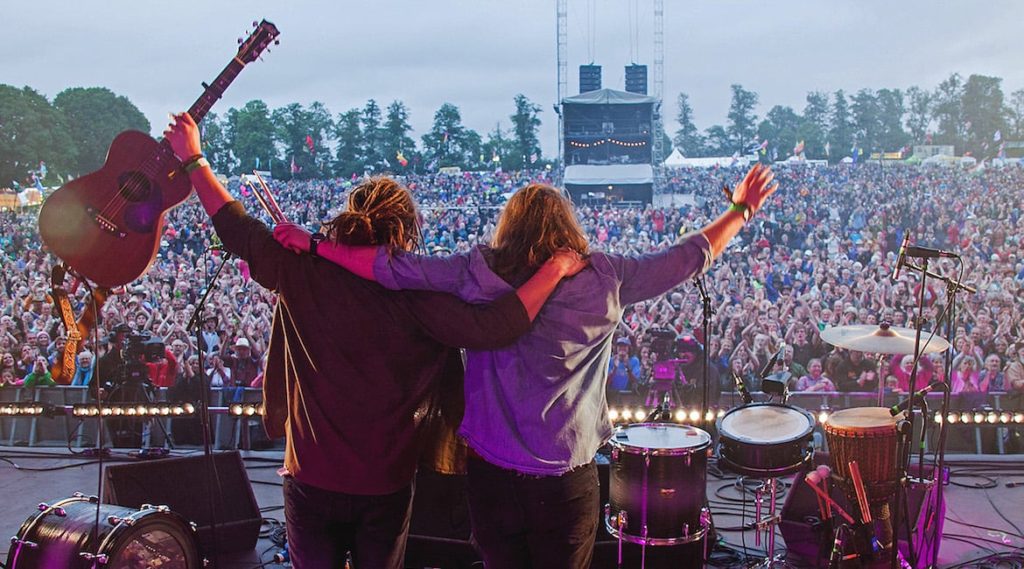
I’ve been a fan ever since, including a few trips to the annual gathering at Cropredy. If anyone questions the ethics of bootlegging music, I paid back in official merchandise and concerts tenfold. It also led me to Richard Thompson and the folk and folk rock scene.
I left school to an electric pastiche
There was nothing to move me or fit my niche
Everyone worshipped the great god synth
Placed on a pedestal, engraved with a plinth
The years passed by and I searched round
Looking to find a different sound
On a nothing night when nothing was planned
I first heard the music of a folk rock band
In a dusty bedsit near Meersbrook Park
It was a bootleg tape that lit the spark
Soaring fiddle, pounding bass
My first trip to a magical place
I played it every night for a month or more
Neighbours banging on a paper wall
After a search all over the land
I fell for the music of a folk rock band
It took a live show to seal the deal
On a summer’s night at the Winding Wheel
Punched in the face by Walk Awhile
I promised myself the extra mile
Unhalfbricking, Liege and Lief
Through the back catalogue I tore like a thief
With Matty Groves the flames were fanned
I was devoted to a folk rock band
On a summer’s night with the scent heady
Finally made the trip to Cropredy
With a mug of wine I know I was there
As the sun was setting to the Hiring Fair
At the end of the night we made a pledge
To return in a year to Meet back on the Ledge
I’ve planted my flag, I’ve made my stand
I’m the devotee of a folk rock band
House Share (Sheffield, 1988-89)
I was part of many house shares over the years. I was on Rushdale Avenue for under two years and I’m not sure why this one stood out. We al clicked. My friend Helen (Bowen) was already renting the attic from David (LeLievre) and Caroline (“Takeaway” Taylor) who were both student psychiatric nurses. I was doing alright financially (I had an A registration Ford Sierra!) and didn’t really need to rent a box room that wasn’t big enough to hold a bed or cupboard, but I did it.

Shifts allowing, we would often eat together. David and Caroline were vegetarian and the main meal was nearly always a bean and vegetable stew with home made garlic bread. We drank together in the White Lion, a distinctive art deco pub on Chesterfield Road. The thing that brought us together was a naughty collie cross puppy called Dill. Dill would eat anything. We often forgot to put the margarine away when we went to the pub and would come home to find the tub licked clean. We never learned and that was a mainstay of his diet. One Sunday lunch at the Yorkshire Bridge I had tied him to my stool. He pulled the stool over when someone across the room dropped a brussel sprout. When David rebuilt the fire place he ate the broken bricks and mortar. At Christmas, he ate all the needles from the tree that he could reach. His poo was green. His other name was “I don’t believe you just did that”.
I was there when Nelson Mandela did his long walk to freedom, watching on TV. Before long, I got a job in London and had to leave. Maybe it was good because I wasn’t around long enough for it to sour. I didn’t last long as a civil servant in London. I realised I didn’t really like the job itself. David, Caroline and Helen all seemed to be doing something more worthwhile than me and seemed to be having more fun too. Helen worked with people with learning difficulties. Eighteen months after leaving Sheffield for London, I was back in Sheffield and starting my nurse training.
Twenty pounds a month buys a mattress on the floor
Feet stuck in a cupboard, head just by the door
My books, my clothes and my guitar would fit into a little car
And so I went to start anew down on Rushdale Avenue
Some days I would trade everything to spend a day back there
In my lovely dysfunctional house share
I’d trade all the tea in China for a lift in David’s Morris Minor
Helen’s room is full of signs we picked up back from the White Lion
And not forgetting Caroline, gently sipping her red wine
Doctor Martins, donkey jacket, her drunken late night take away habit
Some days I would trade everything to spend a day back there
In my lovely dysfunctional house share
Bruce Cockburn serenades us all with the strains of Peggy’s Kitchen Wall
If you want to find us you can try and search the back in the White Lion
Then there’s Dill with shiny nose, mostly Collie part who knows
Always stealing margarine, caught red handed at the scene
To eat a Christmas tree is hard, he pooed green poo into the yard
Tore the Yorkshire Bridge apart chasing down a Brussel sprout
And I hope that in the future our children will be there
In their own dysfunctional house share
Come hear the music play (Lincoln, 1990s to present)
My musical collaborations are listed elsewhere. The Terracists has been, by far, the longest of these. I’m not sure why I decided to write a “this is the band” song. I must confess to delusions of grandeur and, in my head, I can see us walking out onto big stages with this playing. I’m not sure why. It isn’t very good. It even poses the question “should I record every song”. For better or worse, I am doing so.
I think I’ve recounted how I started playing with Phil Robinson already on this site. To save you a search it was a late and drunken night at Cold Keld, a basic cottage we rented from time to time in Cumbria. I discovered that Phil could sing “She moved through the fair” a song I loved playing but hated singing. The rest is history.
I first became aware of Roger Williams on a trip to the Cambridge Folk Festival. Roger had been very drunk and had mistaken a wet wipe for a cheese square. I’m not sure when he joined Phil and I and made the duo a trio. I’m not even sure if he truly has. He’s very much his own person, although he does wait until the end of the show before he disappears into the night. Given that he lives only two doors from Phil, he’s really difficult to pin down. We didn’t see him for over a year in lockdown (stuck on a narrow boat); we met again at a gig we played together, no rehearsal.
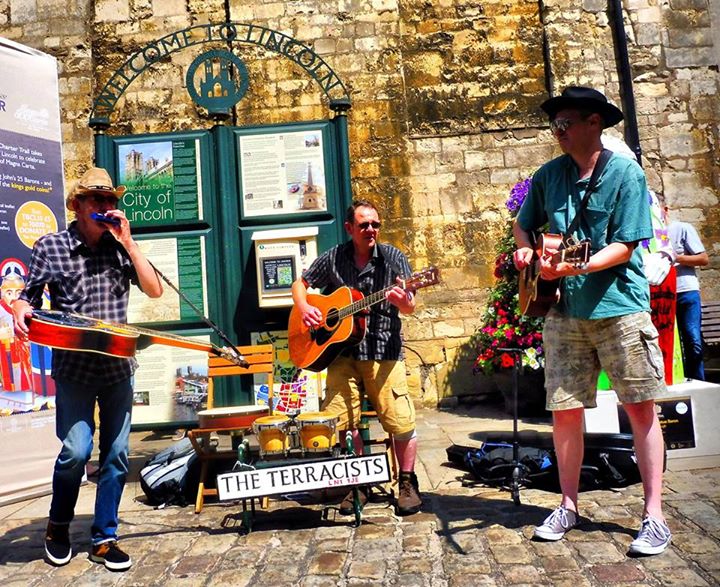
Come hear the music play
Come and listen and don’t be cagey
Please bring your friends and gather round
And feel the beat pulse through the ground
Phil has got a new guitar
He practiced ‘til his fingers bled
And then he went out and hit the road
The critics say he could go far
He could have played the stadia
But he’s happy in a pub with his rock and roll
Come hear the music play, come and feel and don’t ask questions
And if the devil asks you let him take your soul
Shake your booty to the rock ‘n’ roll
And Roger on harmonica
The master of the twelve bar blues
He felt the rhythm on the day that he was born
From The Tap to the Morning Star
From winkle pickers to his blue suede shoes
He’s jammed the night away into the dawn
Come hear the music play, come and sway and feel the rhythm
Come and dance and let your hair hang down
Feel the beat and come and claim the town
And me I’m happy plucking strings
And looking at the smiling faces
And I feel that I can have it all
The pleasure that the music brings
The memories of friends and places
And then it’s time to take the curtain call
Repeat chorus
Old Leather Suitcase (Lincoln 2018)
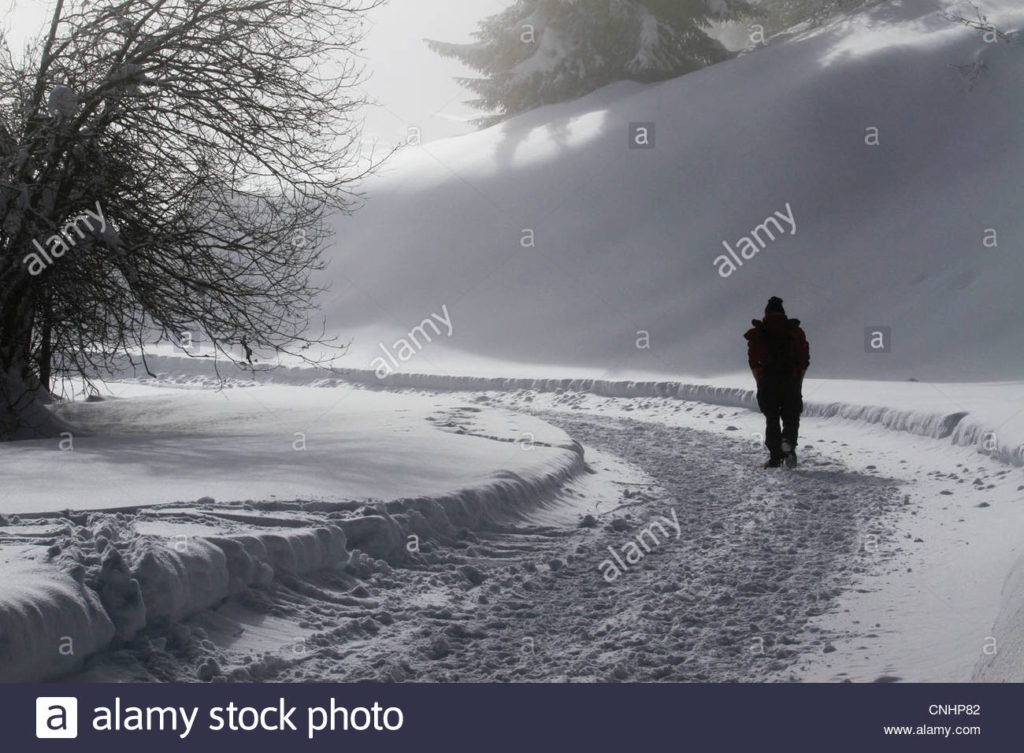
In 2017 it started to become clear that dad’s memory was worsening. It felt like a baton was being passed from him to me and my sister, Sue.
The holly and ivy, mulled wine and beer
Please raise your glasses and be of good cheer
To those far away and those who are near
We wish you a happy New Year
The month of December with snow on the moor
An old man presented himself at the door
Although silhouetted against winter skies
He carried the weight of the world in his eyes
I opened the door and we let him inside
He carried a suitcase down by his side
Chorus
We sat by the fire drinking our wine
There was laughter and tears as we talked of old times
And heard in his voice the wisdom of years
Half way to misery, half way to fear
The old leather suitcase lay by his feet
It was tied up with string that was singed by the heat
Chorus
A cold and grey morning the old man was gone
He trudged his way up the long path all alone
The old leather suitcase was still by the embers
And I stared at it all of the month of December
I didn’t want it but I knew it was mine
And it would be with me for all of my time
I would fill it with love and when my time was done
I’d pass that old suitcase on to my own son
I say I’m doing fine (Lincoln 2018) featuring Kevin Todd on harmonica
I work in a hospital and I get to pound the corridors a lot in my job. Everyone is friendly and we ask each other “how are you” many times every day. We are not expecting an answer, however. We are too busy for that. Whatever trials, tribulations and tragedies are passing us, the answer we give is that we are fine. There isn’t time for the long answer, except for our closes colleagues.
No-one has a garden that’s always rosy
No-one has a home that’s always cosy
When skies are grey I always say
You’ve got your problems I’ve got mine
So when you ask me, which you do from time to time
I say I’m doing fine
They say that no-one is an island
There’s always clouds on the horizon
When I’m feeling blue, there’s something you can do
Just pour the wine
So when you ask me, which you do from time to time
I say I’m doing fine
There’s always someone lying, always someone crying
Always someone trying to make you feel like dying all the time
There’s always someone grieving, always someone thieving,
always someone leaving you and cutting you right down in your prime
So when you ask me, which you do from time to time
I say I’m doing fine
It’s not that I don’t want you to know me
But in your presence you have shown me
That you really care, and you are there
When I need you and that’s fine
So when you ask me, which you do from time to time
I say I’m doing fine
Modern Highwayman (written Rob Oldfield and Phil Robinson, featuring Phil Robinson, vocals,)
This song started with one of Phil’s favourite songs; “Too Close to the Wind” as recorded by Fairport Convention. Its one of the few songs he knows about his native Northamptonshire. It tells the story of some thieves who were caught and hanged and contains the lines “from Daventry down to the southern byways, we robbed both the rich and the poor”. Phil and I thought anyone trying that now would have to face the racetrack that is the Daventry bypass and robbing anyone may be difficult. The idea took shape. The structure, although in a major key, is a lift from the “Raggle taggle gypsies / Seven Yellow gipsies” song. Over the years, we’ve lost track of who wrote what but Phil rightly claims the last verse.
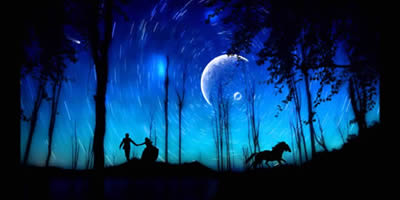
It was late last night when the boss came home
Asking about his lady-o
And the servants do say that he’s gone away
With a man with a CB radio
Come gather me my milk white steed
And go and pack my pistol-o
Go fetch my cloak and that really dodgy bloke
That we picked up in Bristol-o
From the top of Shap to the Watford Gap
You can ride as quick as you can
With a flash of the cape you’ll never escape
From the modern highwayman
We rode out east and we rode out south
All in search of our lady-o
In church we lit a candle all to get a handle
On the man with the CB radio
In London we searched the registers of UNSCOM and UNESCO-o
And our horses waned in the London rain
As they grazed on the gravel in Tesco-o
Our spirits fell like a goat from hell
As we ambled north to Leicester-o
And before we could run we stared down the gun
Of a man in a so’wester-o
His “stand and deliver” made our knees quiver
As the rain dripped off his poncho-o
And in less than five seconds we threw down our weapons
And we made him our head honcho-o
With a knife in the dark and life’s car park
We advanced our reputation-o
We’d hit and we’d ride to a secret hide
On a motorway service station-o
We got our ticks on the A46
Where the sheep all graze on the heather-o
And we got cheap personal stereos
With litres of unleaded-o
Deported from Australia
Vic was full of worries-o
But he made it pay on the queen’s highway
Where he was robbing lorries-o
For the theft of some cress and wearing a dress
They sent him north from Hobart-o
And he met his end on a hairpin bend
At the hands of Eddie Stobart-o
Reconciled (featuring Kevin Todd on harmonica)
This could be the best day of my life
Because I’m coming home
Got my friends they’ll be waiting for me
But my family who knows
When I was young I didn’t take the easy course
There was a bad crowd around
Had some fights and too many long nights
On the wrong side of town
I hope there’s a young girl waiting there for me
When I left she was a child
What do I say how do I repay
Will we be reconciled
This could be the best day of my life
The tears will be of joy
I’m a little scared and quite unprepared
When I left I was boy
One night in a bar we’d been drinking
It was a long sultry night
There was a fight and somehow a knife
Been coming all my life
I hope there’s a young girl….
I’ve had a long time to regret what I have done
When you’re doing time there nothing but time
I’m on the train coming away from my pain
My future’s on the line
This could be the best day of my life
But will she be there
After all the tears all the wasted years
I hope that she cares
There’s a figure on the platform ahead
Her face is a mask
I’ll give her her due after all that we’ve been through
That is all I can ask
I hope there’s a young girl….
Senator McCarthy (with Phil Robinson on vocals)
Inspired by the film “The Front” by Woody Allen. I hope there aren’t any Americans reading this. To explain modern US history I divide America into three parts; the bit in the middle and the bits down the edges (coasts). The people at the edge are a bit like us. They produce all the books, plays and films. The people in the middle are the ones who voted for Donald Trump; they produce the food and make the cars. In the 1950’s the ones in the middle started to worry that the ones at the edge were trying, through their art, to turn them into communists. They put pressure on politicians to stop this. Senator Joseph McCarthy set up the committee of un-American activities. Writers and artists had to prove that they were not communist sympathisers. Those who could not do so were black listed. Nothing was written down but they could not find work. Livelihoods were lost and some people committed suicide.
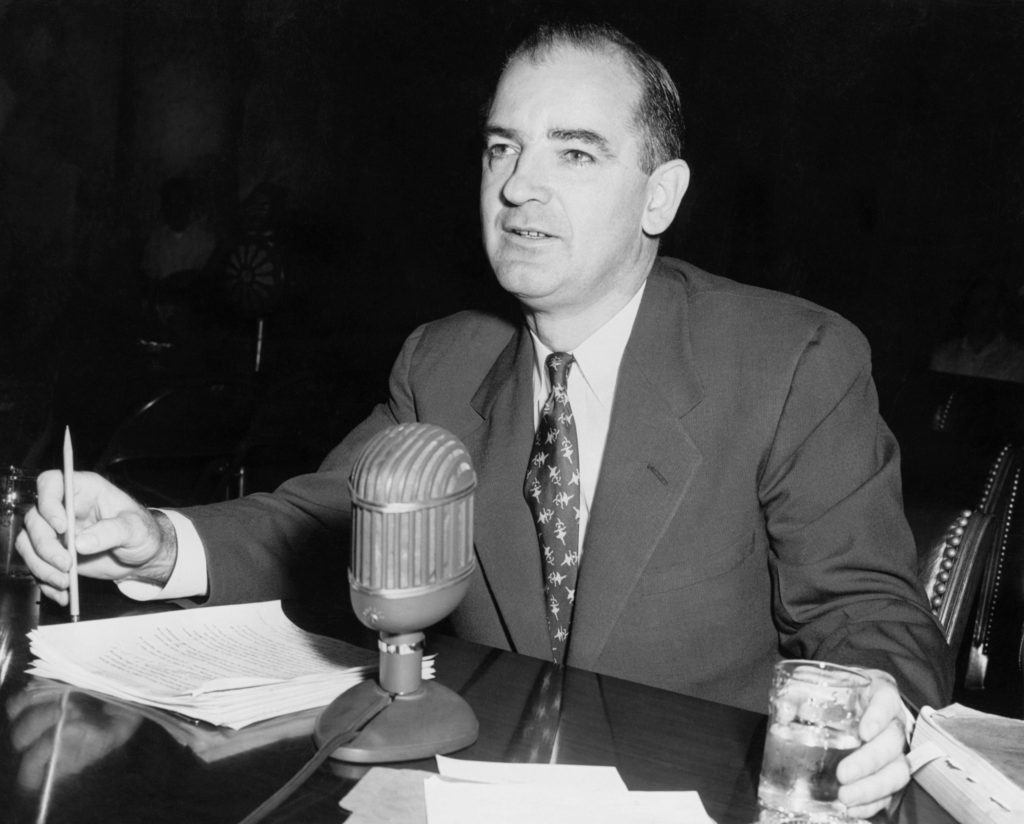
Senator McCarthy, I’m in need of some advice
I’ve just received this letter and its content isn’t nice
It says I think the USA is not the paradise
That I once knew, what can I do?
Senator McCarthy I hope you understand
That I’ve got to make a living and on this I hadn’t planned
What good is a writer whose work has all been banned
I’m in a stew, what can I do?
And Senator McCarthy you have got me in your grip
You and your committee on your power bending trip
Just you watch your back and watch your halo doesn’t slip
‘Cause I’ll be there, so you take care
Senator McCarthy I hope you recognise
That the contents of this letter are a litany of lies
And calling me a communist surely takes the prize
This red feels blue, what can I do
Senator McCarthy you have got me in the mess
You have all the power I have no means of redress
I see you on the TV with your buddies from congress
Sitting pretty, in the city
And Senator McCarthy I am fed up of this land
And if you think that’s un-American then you don’t understand
That to like a beach you don’t have to like every grain of sand
You artless swine, you Phillistine
Senator McCarthy I am now at my wits end
I am hungry, cannot feed my kids and I cannot pretend
That I’m not at your mercy and am able to defend
My family, so pity me.
The Witch Burning
We visited Fife in 2018 and my friend Ken Foster gave my son, Adam, a copy of a poster from the Fyfe Brewery. It outlined the expenses undertaken in order to burn two witches in Kircaldy in 1633. It was too tempting to resist. I sat down with a calculator and carefully crafted this song….. A “pricker” was a particular sort of torturer designed to find “the devils mark”. They would repeatedly poke the “witch” with sharp implements and the devil’s mark was a point which, when “pricked” would not cause pain. A rudimentary knowledge of the pain gate theory would show that this is achievable in any person. Prick someone repeatedly in the same area and the spinal nerve gate will close and stop sending messages back to the brain.
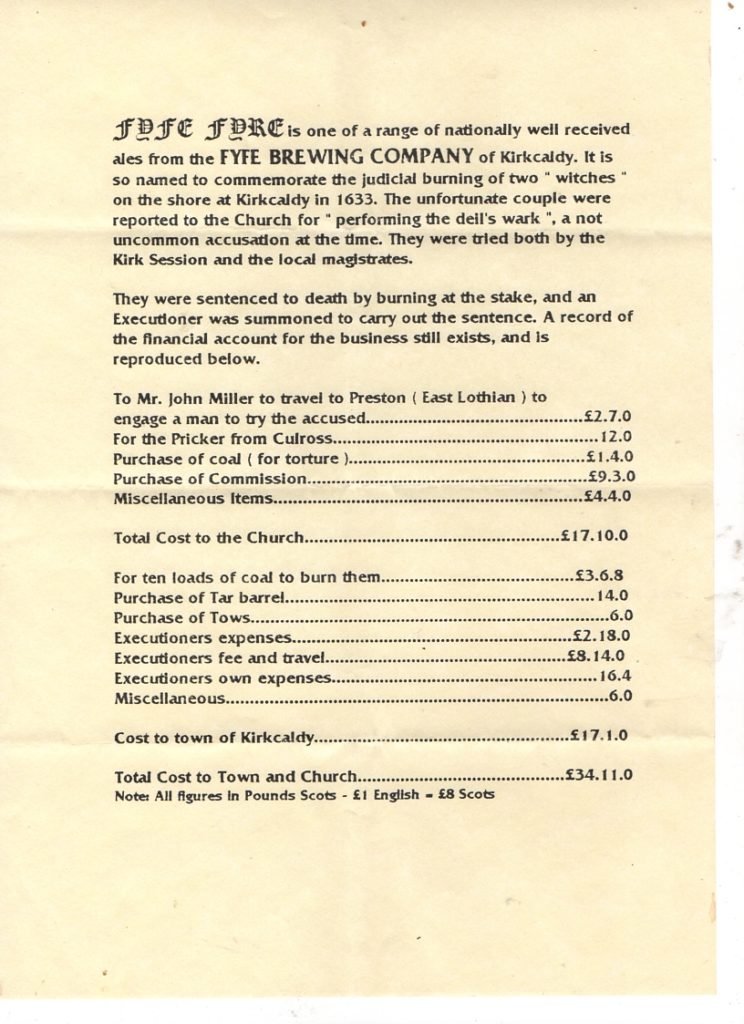
On the banks of the Forth in Kirkcaldy
In the year of our Lord 1633
Two people were accused of the devil’s work
And they stood before a session of the kirk
John Miller was sent to East Lothian
For which he was paid £2 and 7
He went to Preston and while there
He found a man to try the pair
We are worried, its concerning
Who will pay for the witch burning?
£12 given as the cost
To bring the Pricker from Culross
He laid his tools out to embark
On a search of the bodies for the Devil’s Mark
A little time of tender care
The Devil’s Mark he could declare
The coal it came to £1 and 4
To pay for the burning and some small torture
The Commission was £9 and 3
To ensure the pair were found guilty
So William Coke and Alison Dick
Condemned by the body politic
An executioner of high renown
Was paid for by Kirkcaldy town
£12 8 the consequence of
Fees and travel and expenses
We never thought it came to this
To pay the price for the Lord’s justice
And so the morning on the shore
The one the town’s been waiting for
The witches dressed in hemp-spun clothes
In tar barrels upon the tows
We stood them high on mounds of coal
£4 6 was the bankroll
And witnessed by Kirkcaldy town
The witches burned into the ground
We came to stand as witnesses
To see them burn as they confessed
The princely sum of 17 pounds
Each to the church and to the town
We hope the witches aren’t returning
We need to save for another of the witch burnings

